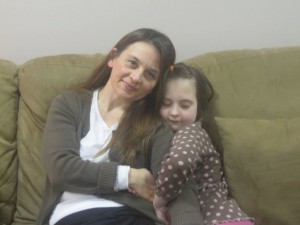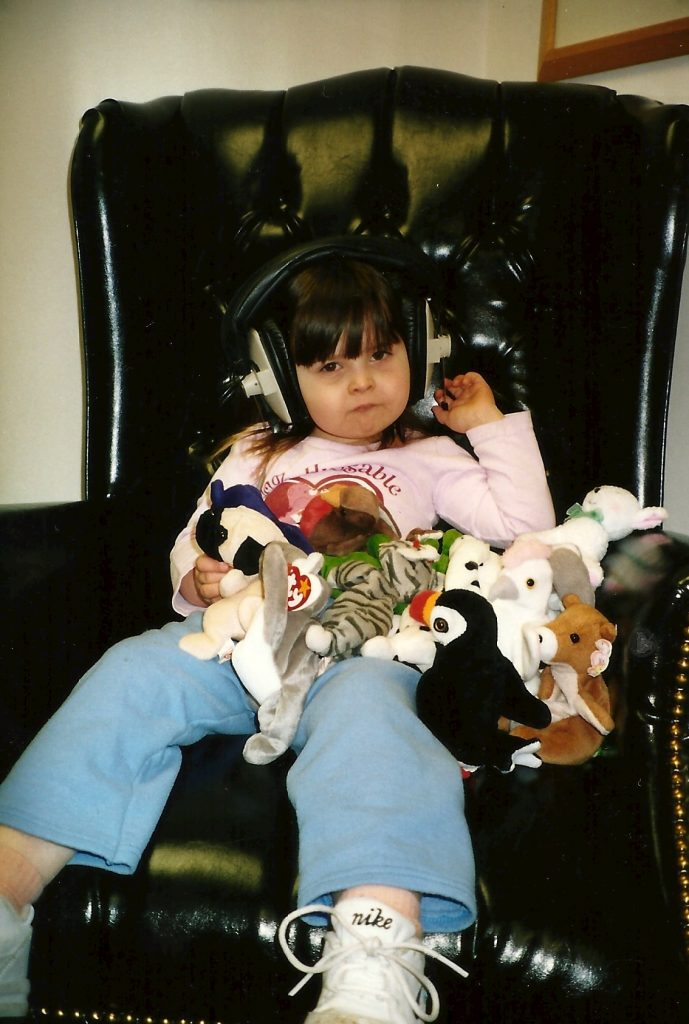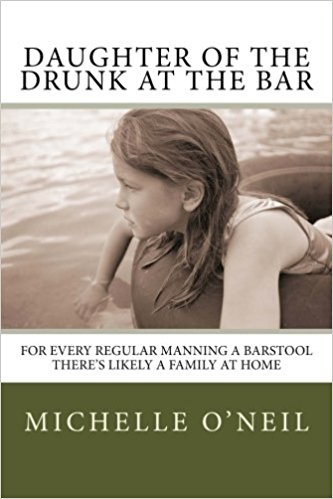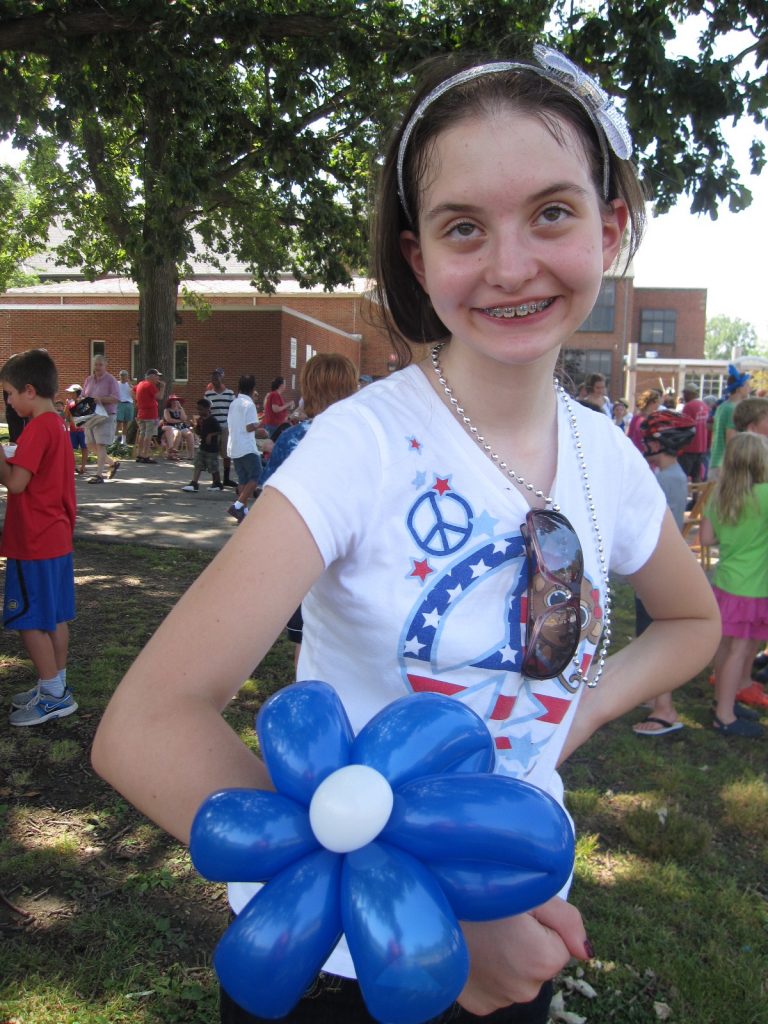
Do you know kids with autism? Have you ever invited those kids with autism to your child’s birthday party?
In a Facebook exchange about three, four, and five year olds still in diapers, one of my friends reminded commenters that some children who are having difficulties potty training may have other challenges. Kids with autism are often in diapers for a long, long time.
That friend is Michelle O’Neil, a book author, former nurse, and mother of two from Cleveland, Ohio. Michelle O’Neil’s daughter has autism.
The author of a tremendous memoir called Daughter of the Drunk at the Bar, Michelle O’Neil has contributed to A Cup of Comfort for Parents of Children with Autism, and Special Gifts: Women Writers on the Heartache, the Happiness and the Hope of Raising a Special Needs Child. She has also written for Literary Mama (which is where we first met on-line. I was the Creative Nonfiction Editor of Literary Mama when one of Michelle’s essays was published) and she blogs about kids with autism, family and the day-to-day at Full-Soul-Ahead.
According to the CDC, at least 1 in every 36 children now has autism. That’s a catastrophic, devastating, epidemic number. Yet parents who don’t have children on the spectrum often have no idea what it’s like to live with kids with autism.
Riley is 18 now.
Six years ago, I asked Michelle O’Neil to share her experience with me, so I could educate myself and other parents of neurotypical children about the reality of living with a child on the spectrum.
JM: How old is your daughter? When did you realize she was on the spectrum?
MO’N: My daughter is 12 and we knew something was up by the time she was about 18 months old. Prior to that we were just resigned to the fact that she was a “fussy baby.” She was diagnosed initially with Sensory Processing Disorder at three years old and then at five got the official Asperger’s diagnosis.

Michelle O’Neil and her daughter Riley, who has autism, when Riley was eight years old
JM: Does having kids with autism run in your family? Do you have any explanation for what happened to her?
MO’N: My husband has an uncle who is undiagnosed but clearly somewhere on the spectrum. We believe that she had a genetic susceptibility to autism, and that environmental factors pulled the trigger. Namely over-vaccination, of both mom and child.
JM: Can you describe a typical day with your children?
MO’N: A typical day now is very different than a typical day was a few years ago. She used to be completely disregulated. My daughter has made huge improvements over the years with bio-medical interventions, therapies (many alternative and not FDA approved), and medication.
She has a great deal of anxiety and the smallest most unpredictable things used to set her off. When she reached this point of no return, there would be horrendous screaming and meltdowns. There was no reasoning with her. No talking her out of it. No punishing her into better behavior. Our family walked on eggshells and it was very difficult for a long time. This was not behavior she could control. She was not a child being a brat though that is what it looked like to people unfamiliar with autism. This was an overloaded neurological system, a brain in rigid vapor lock. Imagine your very worst hangover—I believe this is how she felt, every day of her life. She was polluted with environmental toxins. She had no ability to cope.
We’ve worked very hard to get her body healthy. We have chelated for heavy metals. Our family avoids chemicals and preservatives in our food. In addition, we eat organic almost exclusively. We limit scented products in our home. She was a great responder to methylated B-12 shots which helped her body eliminate toxins.
She’s participated in many therapies including occupational therapy, Berard Auditory Training which improved her balance and helped reduce her extreme sensitivity to sound. She has taken therapeutic dance, martial arts, and horseback lessons. She received music therapy for years.
In addition to the MB-12 shots, we’ve done homeopathics, Chinese medicine, chiropractic, cranial sacral and a slew of other things to help her body calm down. She currently takes an SSRI medication which has helped her a lot. We pulled her from school three years ago when we found out she was spending a good portion of her time there isolated and crying in a sensory room.
All that being said, she’s doing fantastic now, and our days look much like a typical family’s day.
She’s only had one or two meltdowns in the last two years.
They used to be multiple times a day.
We’re not involved in as many activities as most American families with children because she needs her down time, but I think that is good for all of us. Her autism gives us an excuse to take life a little slower and we like it that way.
JM: You told me that sometimes it’s challenging when you’re out in public and people judge your daughter’s behavior without knowing about her disability. I’d love to hear more about that.
MO’N: After a certain age, say three, people are less forgiving of a child having a meltdown in public. Particularly a child who looks typical. Autism is hard because it is often an invisible disability. My daughter could always talk. She could look at you. When she wasn’t upset, she was very charming and delightful with her big vocabulary. So to see a child like her suddenly lose it because a bee flew too close to her ear or because the children at a party sang “Happy Birthday” too loud, or because the sun was too bright, or the room smelled funny or a baby cried, it looked strange to them.
When she was little we got a lot of eye rolls. A lot of glances exchanged between other parents. It was hard, because we were knocking ourselves out to parent this child, and trying to be a good parent to her baby brother, and it was exhausting… to be judged on top of it, just sunk my heart sometimes.
JM: What do you wish mom and dads who don’t have a child on the spectrum knew about autism?

Riley, age 3, receiving Berard Auditory Training
MO’N: I wish they knew how much being included once in awhile means for a child with autism. It seems like many typical parents fear if they give an inch, we’ll take a mile. Like, they are afraid we’ll need more than they are up for, so they don’t “get involved.”
My daughter has typical friends who frankly live in a different universe (just up the street). But they include her a couple of times a year, inviting her to birthday parties or to go trick-or-treating. It means the world to my child. She doesn’t sit around fretting that she barely sees them. It doesn’t even occur to her.
Her idea of friendship is different than most girls her age. She wouldn’t want weekly play dates. It’s not her thing and it would be too much. She’s happy. She considers these girls her friends, which they are. They are awesome kids.
We’re not going to glob onto you and ask for too much. Don’t be afraid of knowing our kids.They’re part of your community and they have gifts to bring too. Most of the time when children understand my daughter’s challenges, they show up big with compassion and support and love. Knowing my daughter is an opportunity for your kids to know their best selves.
JM: Do you feel like you get the support you need in your community?
MO’N: People don’t always know how to support you but it seems if you give them opportunities they show up. When my daughter was younger and had no friends, we started a Circle of Friends group for her, which met monthly at our house. We did an activity and some social skills exercises and had a snack. Every kid we invited showed and even some extras came.
Our community also raised thousands of dollars in a very short time to pay for our daughter’s service dog a few years ago when we put out a call for help. Asking for help is the hard part. And it is tricky to ask for help. You have a child you feel you can’t leave, because she will inevitably meltdown and the babysitter or relative won’t understand what to do. What parents need is respite! But how do you ask for a baby-sitting trade under these circumstances? There are few people I trust to leave my child with.
We have also received great support from the homeschool community. Homeschoolers seem to welcome and value difference more than mainstream society. And many homeschoolers are frankly in the same boat, whether their kids have an official diagnosis or not.
JM: How can teachers, politicians, and others better support parents with kids with autism?
MO’N: Teachers really are the ones in the trenches. Ask any seasoned teacher if it’s just better diagnosing or if way more children have huge issues and they will tell you our children are suffering in greater numbers than ever before. There are many amazing teachers working with kids with autism and no one deserves more respect. I would tell teachers in general, if they don’t have love in their hearts for kids with autism, please don’t attempt to teach them. Love is the key ingredient. Tough to mandate but without it teaching a kid with autism is a figurative bloodbath.
I would tell politicians to quit taking advice and money from the pharmaceutical industry. Stop the over-vaccinating of our children. Give autism families money for respite.

Cover of Michelle O’Neill’s memoir, Daughter of the Drunk at the Bar
JM: Do you worry about your daughter’s future? What will happen when you and your husband are too old to care for her?
MO’N: I honestly can’t predict much about my daughter’s future. I could never have imagined just a few years ago how far she would have come today. Her progress blows me away. I have no way of knowing what she will be capable of. In many ways it appears she will be able to live independently.
We keep working toward that goal, but at 12 it is too soon to know. I know parents of kids with autism who share a totally against-nature secret thought that it might be better if their child dies before they do. We’re frightened by the thought of what might happen to our kids with autism when we’re gone.
In other cases, autism sibs will have to manage care. The siblings are truly the unsung heroes of the autism epidemic. What these kids deal with and the amazing big hearts just full of compassion and depth that I see in so many of them. It gives me hope for the world.
JM: What are some books you recommend to help people understand kids with autism?
MO’N: Dr. Ross Green’s The Explosive Child. Best book ever. The premise is: a child does well when they can, and when they can’t we need to give them support. No child wakes up in the morning and decides, today I will act like a brat. Another gem in Green’s book is “Don’t match a child’s inflexibility with your own.” It’s a wonderful book, not just for autism.
Another book is Dr. Kenneth Bock’s Healing the New Childhood Epidemics, which explains that autism (and ADHD, asthma, and allergies) is not a fixed state, but a physiological condition which can be treated. In some cases kids with autism can be healed.
Son Rise by Barry Neal Kaufman is a good start, for parents of newly diagnosed kids with autism. It is about meeting your child exactly where they are, loving and accepting them, while working with them and hoping for progress.
JM: Do you have advice for parents reeling from a new autism diagnosis? What’s their best course of action?
MO’N: Breathe. Keep an open mind. Know that there is a lot you can do to help your child and other kids with autism. Go with your own gut, and make decisions from a place of power and not a place of fear. Weigh any and all advice carefully but understand you are the ultimate authority and advocate for your child. This is a sacred journey you are on and it’s a marathon. Pace yourself.

Riley, who has autism, posting for a photograph on July 4
Related posts:
Scientists Unable to Find Autism-Specific Genes
Do Vaccines and Tylenol Cause Autism?
Healthy People Wearing Masks to Save Themselves From Covid
Published: August 17, 2012
Last update: April 14, 2021
This is wonderful. Thank you so much for writing this. It gave me an even deeper awareness of all that Michelle and her family handles and with such grace.
Beautiful! Just beautiful!
xo
You write about parenting issues for a living and had to be reminded by your friend that there are legitimate reasons for an older child to be in diapers? Hmm.
This was so very enlightening. I never realized how complicated and difficult having an autistic child is, on so many levels. This child is extremely lucky to have such a supportive family.
Thank you Jennifer for this interview and Michelle for the answers. Riley is fortunate to have you as her mom. That so many children are born autistic breaks my heart. Thank you, also, for suggesting books. I look forward to getting them from our library and learning more.
This is such an important post. I am in awe of parents like this who deal with SO much to get and keep their kids healthy. It is overwhelming to think about. Like you, it probably would not occur to me to think that a child who otherwise appeared normal might have a reason to be in diapers. This was a good reminder for all of us that things are not what they seem, no one should judge, and we should always reach out to those around us.
It is hard to imagine the constant challenge of working with a child with these problems. Not knowing the future is terrible–but then none of us really do. Keep your eye on the possibilities. I have a friend with an adult autistic child who lives independently, and when she was young they feared that would never happen. Thanks for passing on tips about how the community and friends and neighbors can be helpful.
This was very enlightening. It actually helps me to better understand a child in my kid’s class, but I believe he’s undiagnosed. This sort of information is what we all need so we can be a better community. Thanks for sharing it.
This interview is about inclusiveness, plain and simple. And nicely done.
I have a niece who probably has a mild case of Asbergers (a cousin to autism). She would hide underneath the table at birthday parties. At Christmas, her mother could only take her to Toys R Us to pick out presents from Santa for about 30 minutes, then the noise would get to her. She’s a truly gifted artist. After graduating from high school, she went away to art college and graduated. But, socially it’s been a struggle for her. I can imagine that autism is 1,000 times worse. Kudos to Michelle O’Neill for gracefully living a very tough life, while educating the rest of us.
Thank you so much for the warm comments here. I think Jennifer asked great questions and I appreciate her interest in our story.
What an awesome story. Many thanks to Jennifer for writing it and to Michelle and Riley for telling their story. I love the happy picture of Riley on July 4th! Blessings to you both.
Great interview and an important post. I taught at a community college and had a woman with autism one semester. I really didn’t know how to handle her outbursts, which only happened on a couple of occassions. It made me want to learn more about autism and how we can all be a little more understanding.